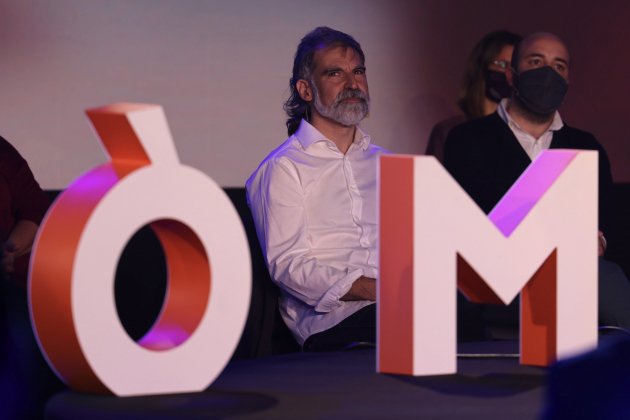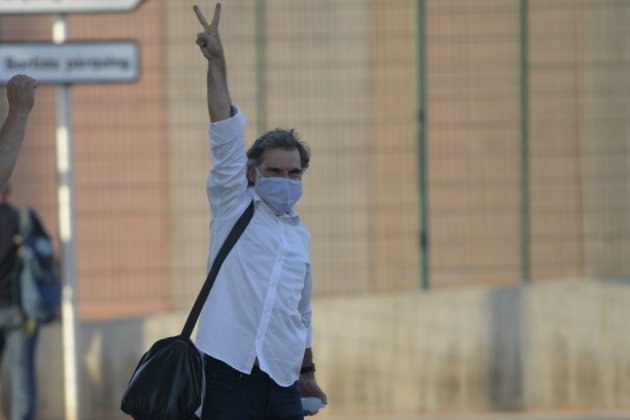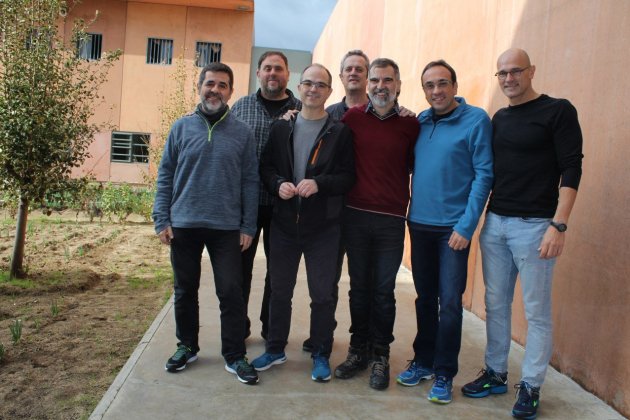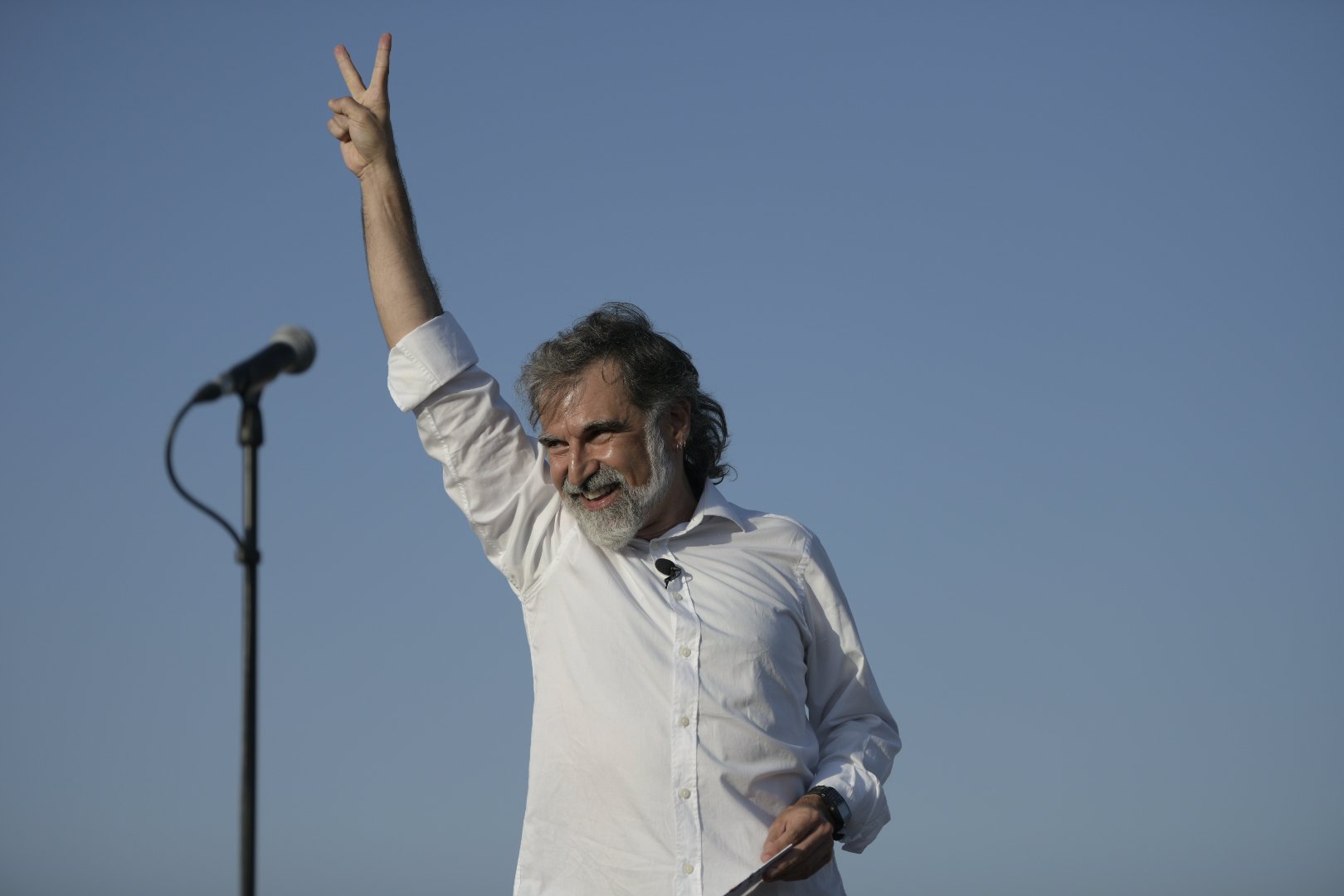Smiling from behind the glass at Lledoners prison, the president of Òmnium Cultural, Jordi Cuixart (born Santa Perpètua de Mogoda, 1975), absorbs the words of his interlocutors. And he can't stop talking. Ideas, reflections and projects cascade out, almost tripping over each other inside the cubicle as he holds the headset to his ear. He has left in some corner of his memory the toughest episodes of his first months in prison. Instead, he has decided to take delight in the moments of reunion with family; in unthinkable conversations with prisoners or Nobel Peace Prize winners; in his readings of Gramsci, Cicero, or so many others whom he might not have known; in pottery classes; and in the construction of a strategy to reinforce with titanium the contention with the Spanish state from a cell in Lledoners.
As he speaks he strokes his carefully trimmed beard. He does not wear a mask. He doesn't need it. He has been trapped in an impregnable bubble for three years and eight months. ElNacional.cat visited him a few days ago for what we thought might be his last interview in prison before the pardons. Cuixart, who has repeatedly insisted that pardons are not the solution and has refused to ask for one, recalls that he went to prison as president of the pro-independence cultural organization Òmnium and he will leave as such. Whenever it is. "Nothing ends with the pardon. The fight continues and we will persist," he says.
The Spanish state's repression has strengthened us as an entity and as a society
At the time of this interview, it seems the Spanish government could sign the pardons at any moment. How do you rate this gesture from the Pedro Sánchez executive?
We are seeing new prison sentences for exercising fundamental rights, as is the case with Marcel Vivet this week. The powers of the state are not weakening and I have spent more time in prison under Pedro Sánchez as PM than under Rajoy. The repression is getting worse, that is very clear. More than 3,400 people are suffering retaliation by the authorities, in exile... And, four years after the 1,000 citizens were injured on the 1st October, not a single policeman has been convicted. In any case, I entered prison as president of Òmnium and said I would leave as president of Òmnium. The Spanish state's repression has strengthened us as an entity and as a society.
The pardons will be the prelude to the defeat that the Spanish state will suffer in Europe.
What do you think is the reason for Sánchez’s decision to make this move now?
The state knows that it is a democratic anomaly in the European Union; the only member state with political prisoners and exiles. Its powers are not unaffected by international demands that reprimand it for flagrant violation of rights. There have been more than a hundred international demands from human rights organizations calling for my release and denouncing that the Spanish state violates fundamental rights. The pardons will be the prelude to the defeat that the Spanish state will suffer in Europe. This will further legitimize the fact that what we did for the citizens of this country is not a crime, on the contrary: the only way to protect the fundamental rights quashed by the Spanish courts is to exercise them.
The Spanish prime minister, Pedro Sánchez, will explain this Monday his proposal in relation to pardons in an event entitled Re-encounter, a project for the future of the whole of Spain.
All of this is an operation to avoid it being recognized that the pardons are not being carried out on their own initiative. The Socialist party, like the king of Spain, has to prove many things before anything that comes from them will have any credibility. They have to do so much more.
.

Jordi Cuixart during a recent Omnium event / Sergi Alcàzar
However, even if the independence movement considers it an insufficient gesture, the pardons are generating a strong response in Spain. How do you interpret that after three years and eight months in prison?
A very important part of Spanish society denies the legitimacy of the people of Catalonia to make their own decisions. This is fueled by the media and the IBEX 35 business world, under the leadership of the powers of the state, starting with the king. That said, I am amazed at how the Socialists have been able to silence the internal criticism of new and old barons in record time when, for many years, they themselves have contributed to the socialization of totalitarian values, to the criminalization of pro-independence ideas as political dissidence, in complete equivalence to the positions of the right and the far right.
I would remind the demonstrators in Madrid's Plaza de Colón that I am in prison for exercising the same right that they did, that of demonstration
You don’t seem very optimistic about the goals.
I am very much afraid that tactics and short-sighted strategies are still predominant and that there is no real will to face the political conflict in a mature way, giving the voice to the people of Catalonia. The state is seriously lacking in democratic culture, and when there is no recognition from the other, it is impossible to treat each other as equals. The state has no serious political project for Catalonia beyond submission. And the triple emergency we are living through does not listen to promises. The death of a Sants resident before eviction from his home is not a suicide, it is a death for which politicians are responsible. In the counties of Barcelona alone there are 20 home evictions every day. Not to mention the new electricity tariffs or the serious systematic ill-treatment at the CIE [migrant detention centres]. Citizens have the right to demand immediate answers.
We have just had a demonstration in Madrid's Plaza Colón against the pardons, what would you say to the people who demonstrated there?
I would remind them that I am in prison for exercising the same right that they exercised on Sunday, that of demonstration.
The people's response to the police brutality of the 1st October and the sentences show that this country is not so easily scared
On the other hand, in the Constitutional Court there has been a significant movement, two votes against the rejection of your appeal, describing your imprisonment as "interference with the right of assembly, with a devastating effect of discouragement on this right that threatens to impoverish our democracy”. Do you think that this discouragement effect is just a threat or that it has already had consequences in the independence movement?
The aim of the threats is this: that we abandon the struggle. And it is obvious that Catalonia has been faced with a new scenario in the last four years. But both the people's response to the police brutality of the 1st October and to the sentences show that this country still has a lot to say and is not so easily scared. That is why I assert the commitment and courage of Catalan society. We are braver than we think and we have learned from our grandparents that the best way to preserve right that have been crushed is to exercise them. Let every person who has lost an eye feel that nothing has been in vain.

Jordi Cuixart at the gates of Lledoners prison in an archive image / Maria Contreras
How do you assess the fact that there are statements like this one from the court, that put cracks in the state's discourse in relation to political prisoners?
It is another fissure in the repressive strategy of the state powers, but the politicization at the top of the judiciary is absolute. What the dissenting votes in the Constitutional Court say is the same as what the UN, the Council of Europe and the great pro-human rights organizations say: that the unity of Spain is not above fundamental rights.
Spain believed itself capable of ending political dissent and the cause for the liberty of Catalonia, and it has failed
Last week, finally you were able to present your appeal to the European Court of Human Rights. Your case has reached Europe. What do you expect to achieve?
Justice and above all legitimization of everything we have done as a society. Basically to keep doing it and, if necessary, with more strength thanks to the endorsement of Europe. We have every right to pressure those who rule to listen to us. Spain believed itself capable of ending political dissent and the cause for the liberty of Catalonia, and it has failed. Also, thanks to those in exile, who have put them in front of the mirror of Europe from the very start. From the day after the verdict, the Òmnium legal team was working to seek justice in Europe. Nothing ends in Strasbourg. The appeal is a very important milestone and we must know how to turn it into a democratic lever.
I am more aware than ever of the importance of not giving up the ideals that have led us to prison
In addition to the ECHR, a report from the Council of Europe calling for the release of the pro-independence prisoners will be voted on Monday. The report warns that the authorities cannot ask you to give up your ideas in order to get a better prison regime or an opportunity for a pardon. Have you felt such pressure to change your discourse?
It is obvious that the pressures are there, behind every writ from the judges and prosecutors. But my convictions are even stronger. Modestly, not only have they failed to change my discourse, but they have succeeded in strengthening it; I am more aware than ever of the importance of not giving up the ideals that have led us to prison, it is a global cause, we are talking about the exercise of human rights that affect the future of our children and all of humanity. This is not about prison leave privileges or personal permits - neither imprisonment nor repression can be a limit to the national aspirations of the people of Catalonia.

The political prisoners of Lledoners (Sànchez, Junqueras, Turull, Forn, Cuixart, Rull and Romeva) / Òmnium Cultural
We will once again exercise each and every one of the fundamental rights crushed by the state
What do you mean when you say we'll do it again?
Just that. That we will re-exercise each and every one of the fundamental rights crushed by the state. The proven facts of the trial say that I have been convicted for calling demonstrations that have become massive, for protesting in front of the judiciary, for my statements as president of Òmnium, a private entity declared to be of public utility. For tweeting! I have been imprisoned for defending the right to protest and the right to self-determination. So let everyone be clear that we will never give up filling squares, streets, ballot boxes or whatever is needed. Protest is one of the main tools we have as a civil society to fight injustice and get things changed. I am an activist and not a politician, if I gave up doing it again, if I gave up exercising the rights and freedoms that have led me to prison, I would be limiting that right for future generations. It would be endorsing the repressive strategy of the state powers against not just the independence movement, but against any citizen movement.
What have these three years and eight months in prison meant to Jordi Cuixart?
A very big change in my life and my family. Keep in mind, however, that three years and eight months is a long time in the life of a person and a family, but it is a tiny period of time in the history of a nation. Nothing will ever be the same again, but this is not only for political prisoners and exiles but for the country as a whole. We have grown up all of a sudden and learned that the limit to our aspirations as a people can be neither repression nor imprisonment. Wanting to make us lose everything, they have made us even lose our fear and have taught us to embrace life, tooth and nail.
Nothing will ever be the same again. We have learned that the limit to our aspirations as a people can be neither repression nor imprisonment
What will you do when you have a pardon letting you leave prison?
If it happens I’ll go back to Òmnium and the factory, go see my parents and friends, and hug my kids and my wife for hours and hours without having to look at the clock. With Txell we have fought like crazy to stay together as a family and we will continue to build our family whatever happens. Nothing ends with the pardon, but the struggle continues and we will persist. The resolution of the political conflict involves self-determination, amnesty and the return of the exiles, we won't leave anyone behind to face reprisals alone.
In the main image, Jordi Cuixart before entering Lledoners prison after the revocation of his open prison regime / Maria Contreras

